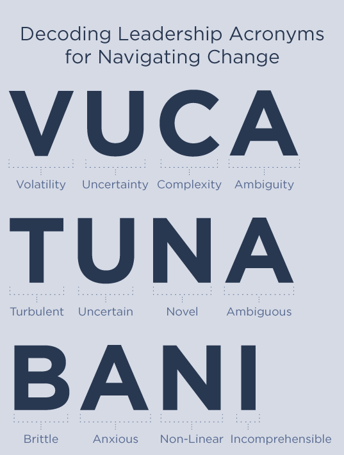In our quest to make sense of complexity, humans have always relied on a simple trick: using seemingly simple acronyms to represent super complex concepts. Business leaders are no strangers to this phenomenon, having spent decades attempting to identify and tackle obstacles in a rapidly changing world. First, there was VUCA, a way to describe leadership obstacles after the Cold War. Then there was TUNA at the turn of the century, and, most recently, BANI, born from a post-2020 world.

But here's the twist – regardless of what we call it, the challenge remains the same: the required skills of leaders are always changing because the world is always changing. Take AI, for example. Look how quickly organizations adopted the technology, from automating routine processes to accelerating ideation. Against an ever-evolving landscape, it has become increasingly difficult for organizations to anticipate the skills their leaders will need tomorrow. To future-proof their organizations, leaders need to be able to navigate ambiguity—a habit best unlocked through experiential learning.
Change is changing
In November, we hosted an event called “Shaping the Future of Human-Centered Leadership,” bringing together a panel of global L&D experts. Among the panelists were Jess Munro, Founding Partner of Revelateur Co.; Gretchen Spreitzer, Associate Dean of Stephen M. Ross School of Business; and Ignacio Guitart, Managing Partner of Achievex.
During the discussion, we delved into the evolution of leadership development and the power skills needed for human-centered leaders of tomorrow. Amid the discussion, one consensus emerged: panelists agreed that the expression “change is constant” no longer suits our reality post-2020. In fact, Gretchen Spreitzer was the first to admit: “'I used to say, ‘Change is constant,’ and now I’m saying, ‘Change is changing.’"
“I used to say, 'Change is constant,' and now I'm saying, 'Change is changing.'”
- Gretchen Spreitzer, Associate Dean of Stephen M. Ross School of Business
Gretchen further explains that change is getting more complicated these days. “Maybe ten years ago, people said we lived in a VUCA world, but now it's VUCA on steroids, and things are changing rapidly.”
Each panelist gave examples from their field of how they’ve witnessed change evolve. Jess Munro pointed to the rising barriers of mentoring in a virtual world, while Ignacio Guitart highlighted the growing challenge of measuring human emotions in data collection.
But whether change is brought on by technological advancements, economic shifts or unprecedented global disruption, the panelists agreed that organizations needed to be better at helping their workforces adapt.
“We're really seeing an emphasis on adaptive leadership,” Jess said, “and at the Stanford d.school (Hasso Plattner Institute of Design), we’re talking about helping [leaders] navigate ambiguity with confidence.”
Need tips and strategies for building resilient human-centered leaders?
Dive into our latest webinar to unlock leadership insights from L&D experts.
What is learning agility (and why leaders need it)
If change is changing, our concept of a “developed leader” might not be as straightforward as one might assume. According to Gretchen, the days of training leaders once and sending them off into the world as finished products are long gone.
“We need people who can learn from experiences as they have them. A key piece of that is reflection.”
- Gretchen Spreitzer, Associate Dean of Stephen M. Ross School of Business
In fact, Gretchen’s research shows that an early indicator of High Potential individuals (HiPos) is their ability to learn from experience. Korn Ferry calls this skill “learning agility” in their recent article, “The Organisational X-Factor Learning Agility,” where they established similar findings. According to Yale University, practicing habits of self-awareness, like asking for feedback and being open to criticism, are sure-fire ways to nurture learning agility. They advise taking time to reflect to “shift your thinking beyond what happened to why things happened the way they did.”
However, getting leaders to be more reflective is easier said than done. While suggesting a desired skill is easy, turning it into a daily habit is another matter. That’s where experiential learning comes in.
A case for experiential learning
The distinction between experiential learning and learning from experience is what truly sets human-centered leaders apart from the rest. This is because those unfamiliar with experiential learning typically reflect and seek feedback after an experience has passed. In contrast, those who practice learning agility don’t wait. They can step out of the moment, reflect during the experience and immediately apply new learnings. As a result, leaders can confidently problem-solve unfamiliar challenges, cultivating their skill sets as they go.
Experiential learning enables leaders to shift away from being reactive to situations to proactively managing them. They emerge with the successful development of new ways of thinking and doing that can be applied to future challenges. With the ability to confidently navigate unpredictability, organizations can not only adapt with agility but also emerge resilient and future-proofed.
Unlock leadership potential
As the business landscape continues to shift, only one constant remains: the future of work is adaptable—so your people need to be too. Nearly three decades ago, Gretchen Spreitzer expressed similar insights on experiential learning that remain relevant today:
"The competencies that get attention today may not be enough to ensure that a person will be an effective learner of the requisite competencies for the future. Given that future demands may include some skills that are different from the skills valued today, the ability to learn from experience may prove to be more important in the long run than a high rating in a currently valued competency."
If you want to truly future-proof your organization, it is essential to train your leaders to be adaptive and resilient through change. Experiential learning enables your people to harness the essential power skills they need to face unfamiliar challenges, whatever they may be.
